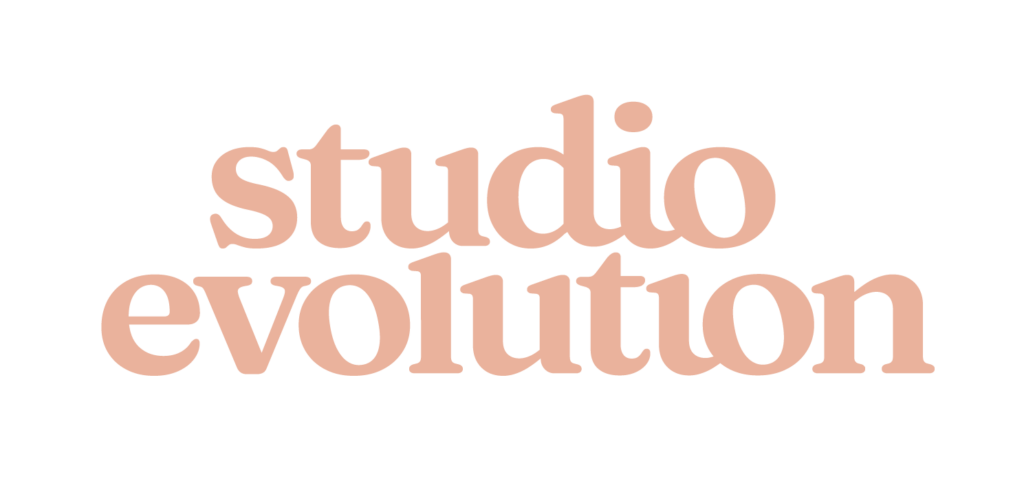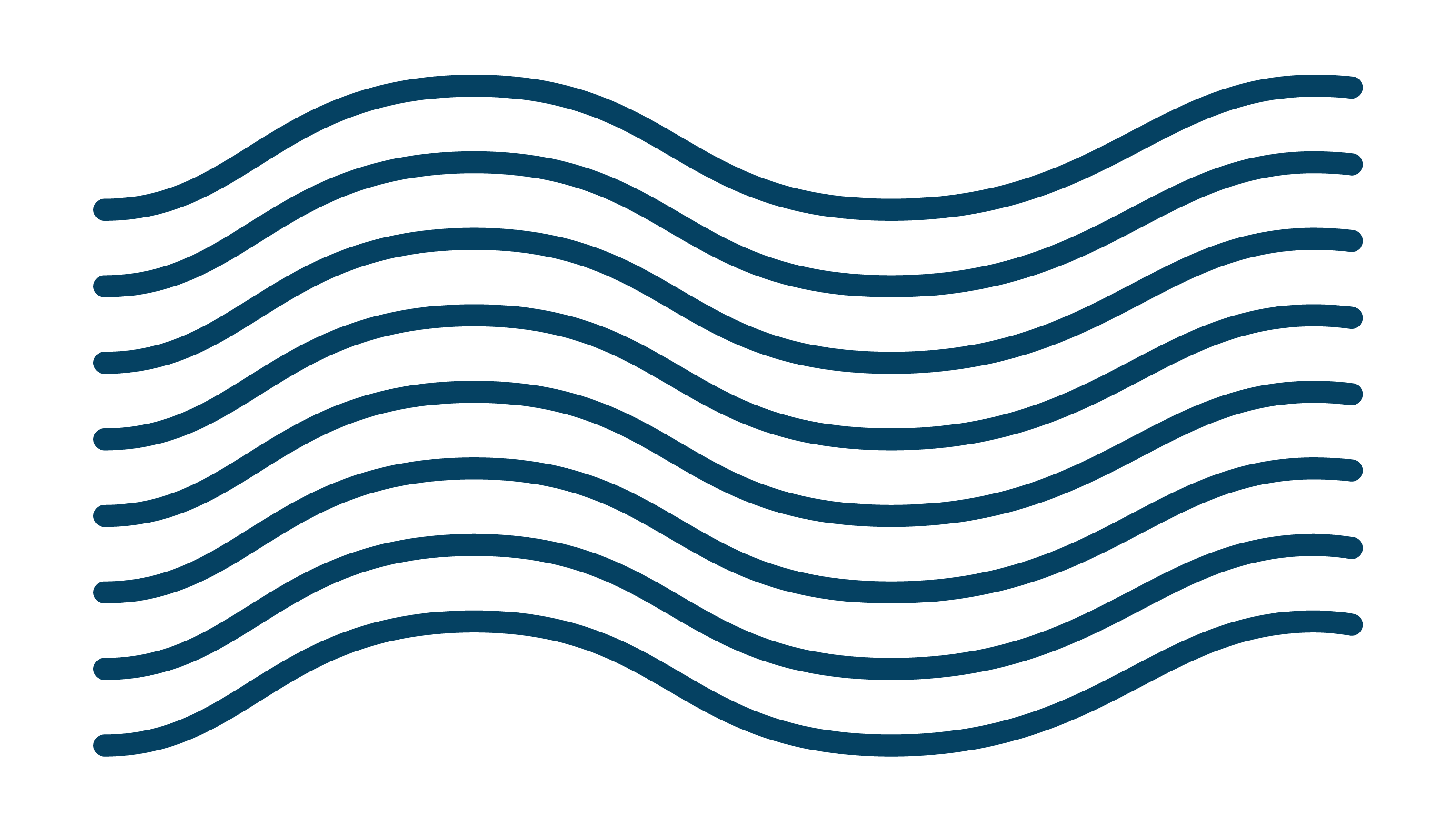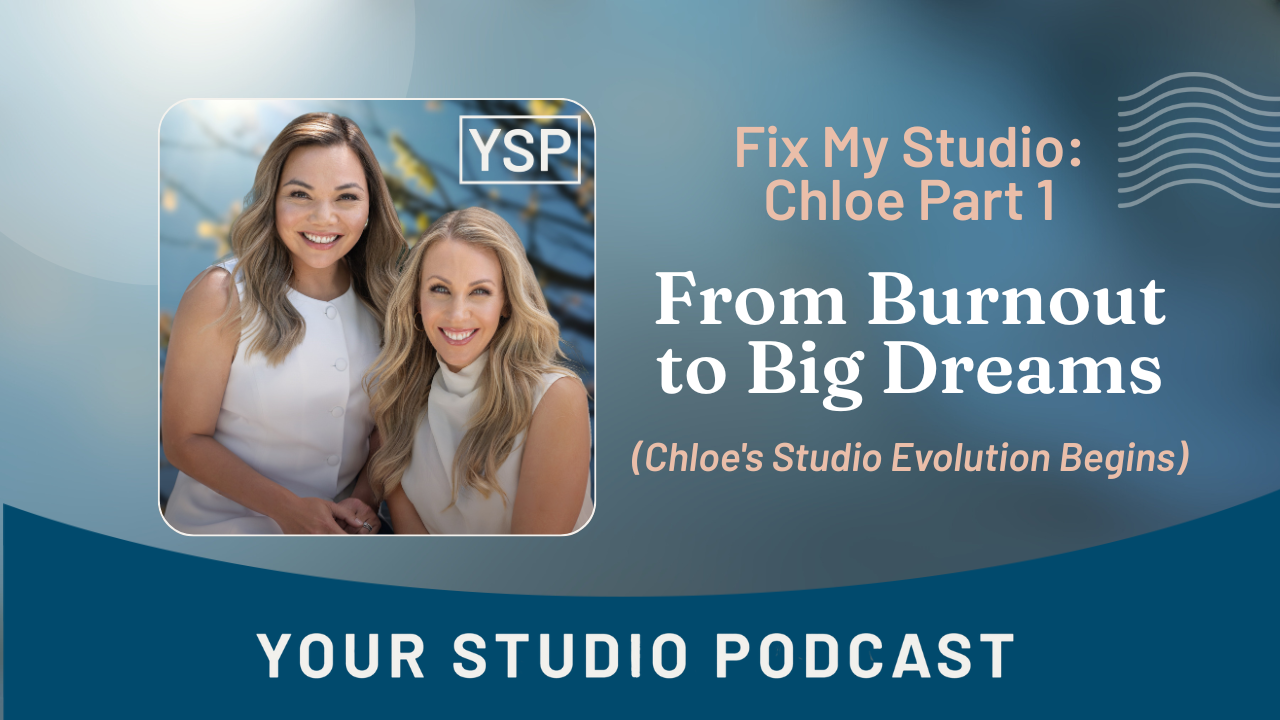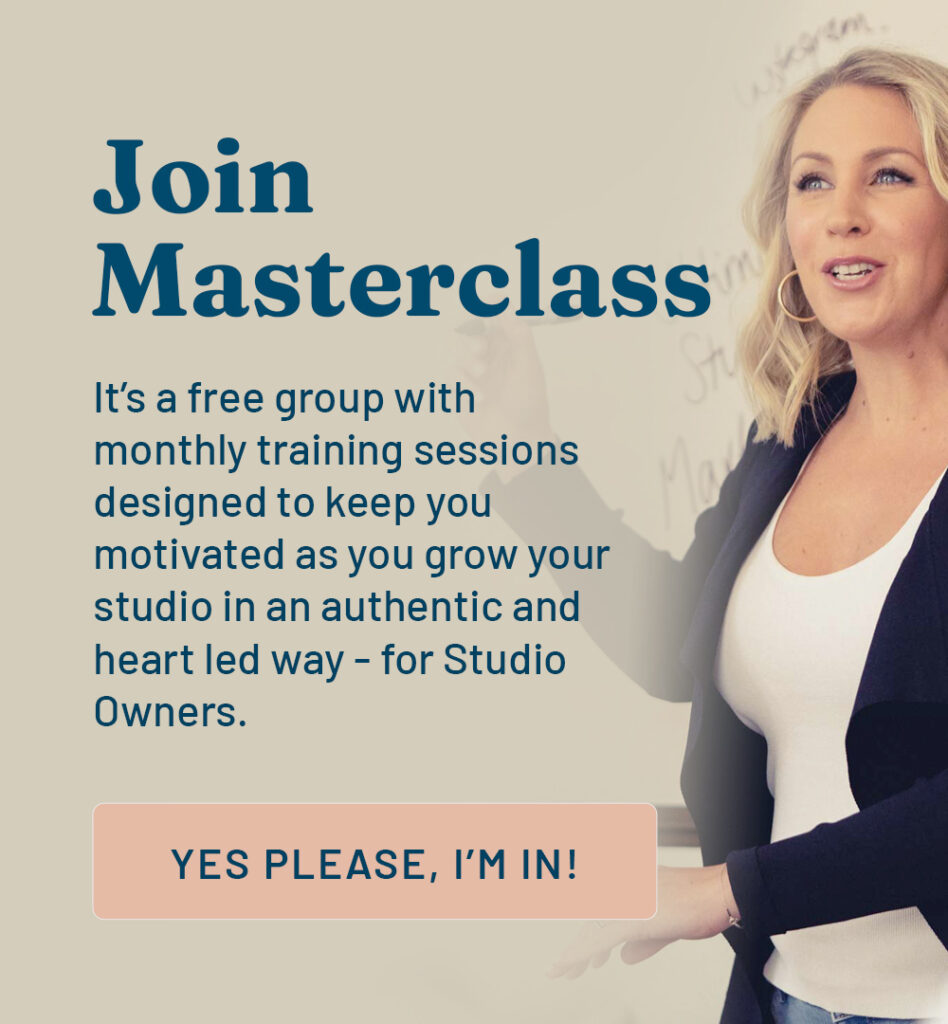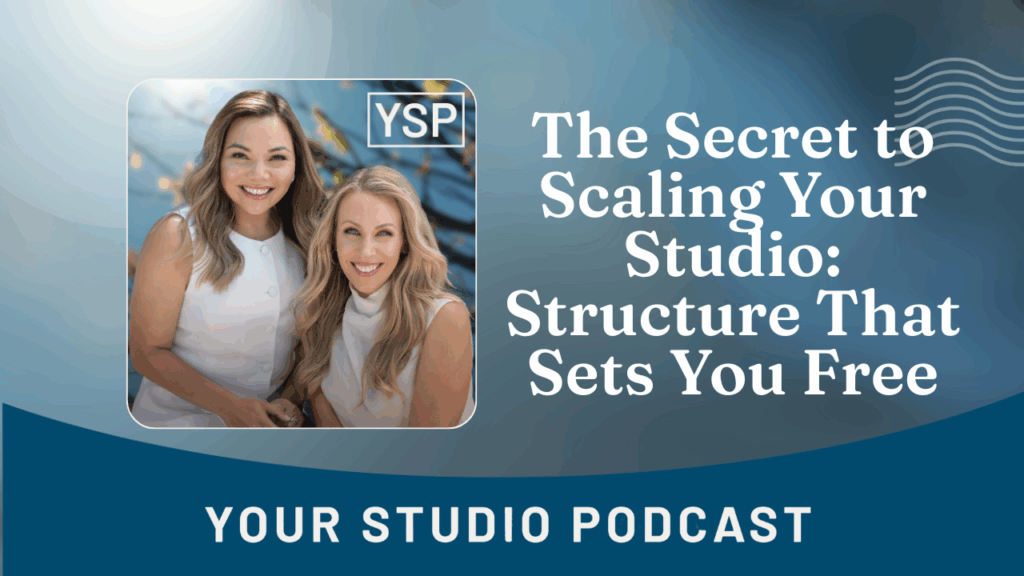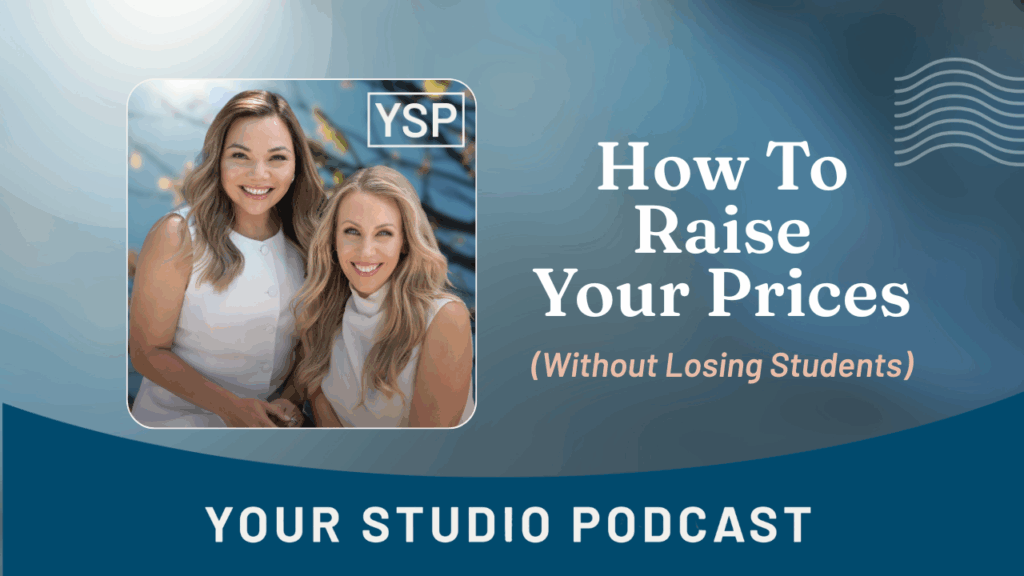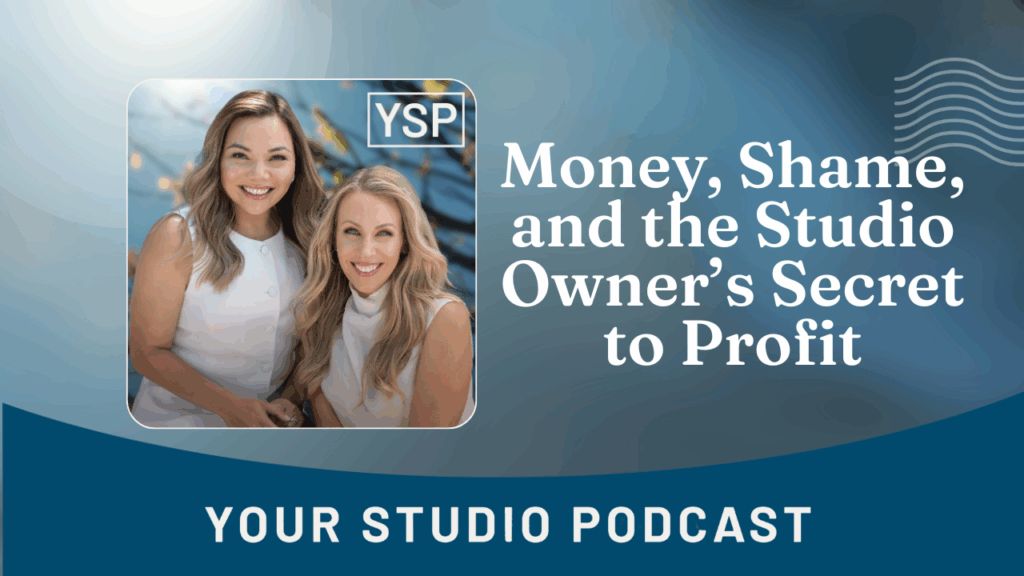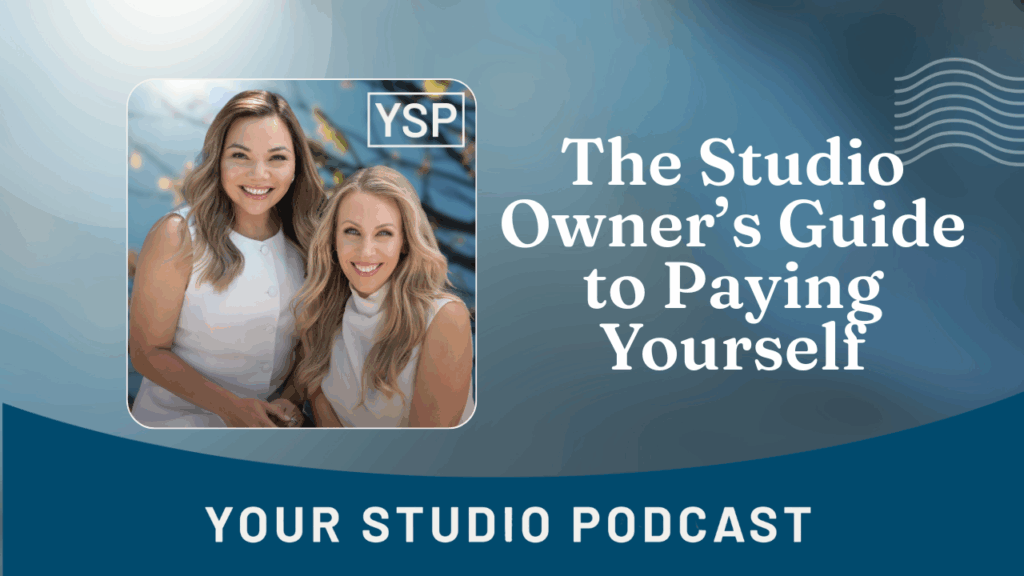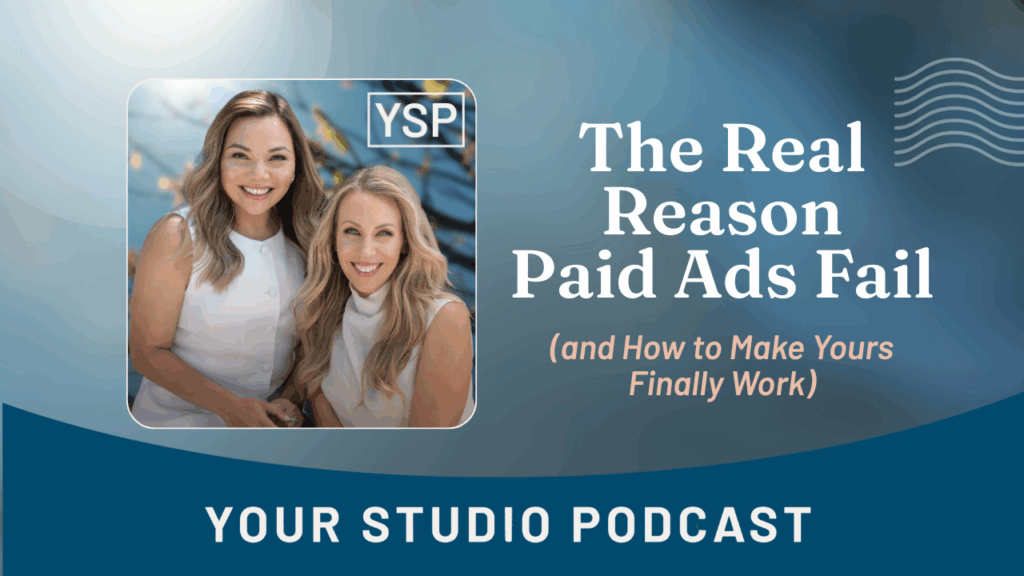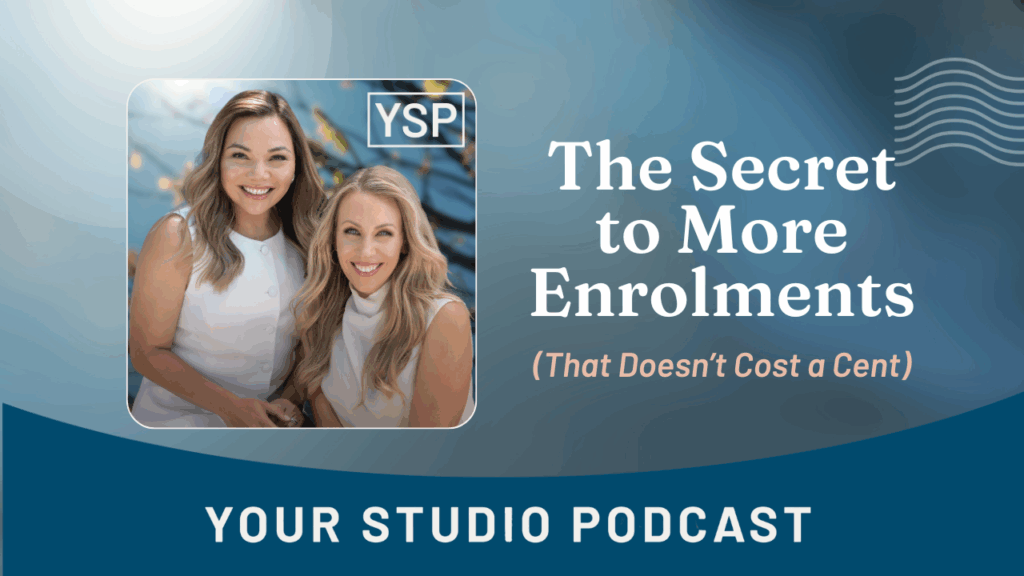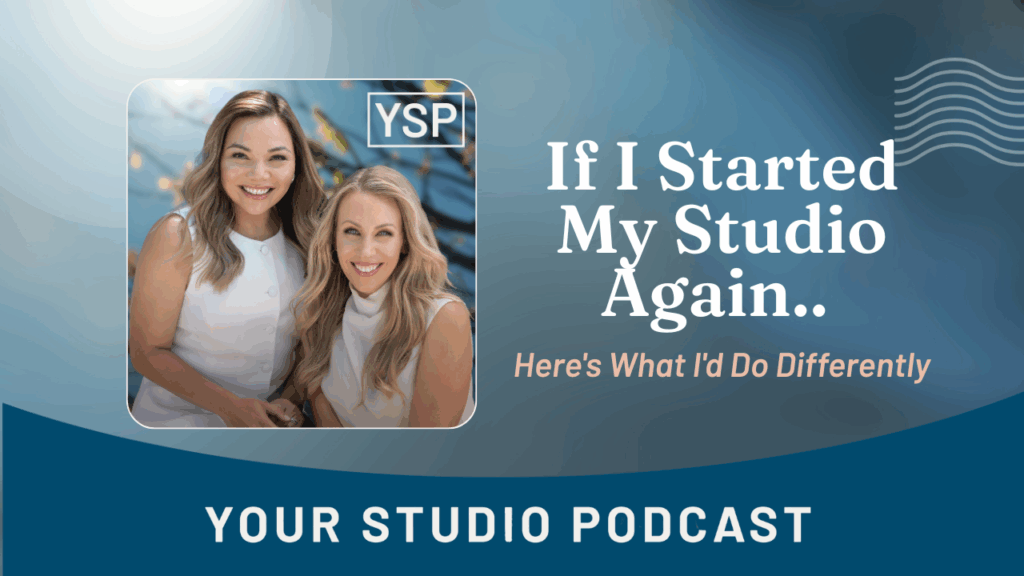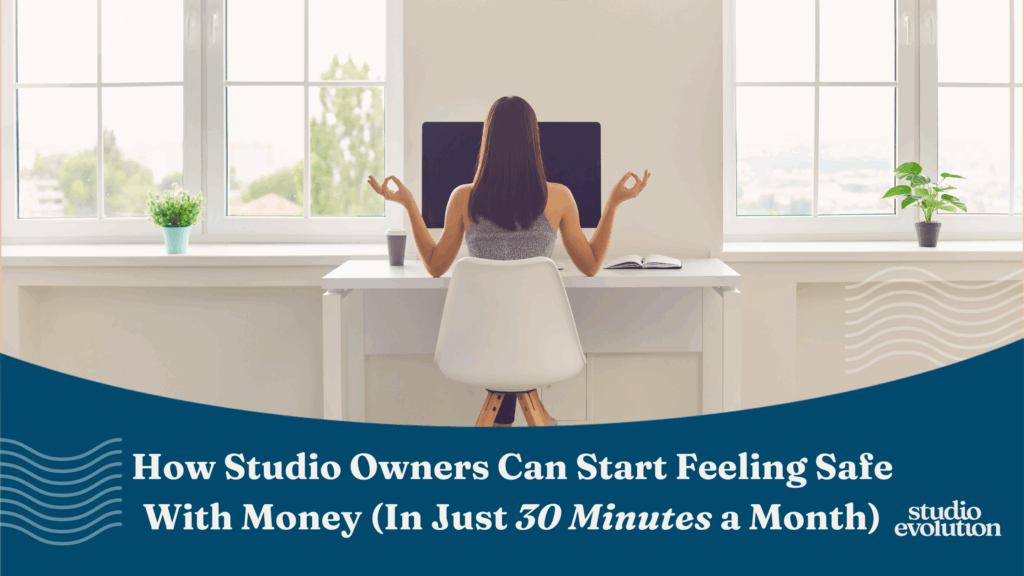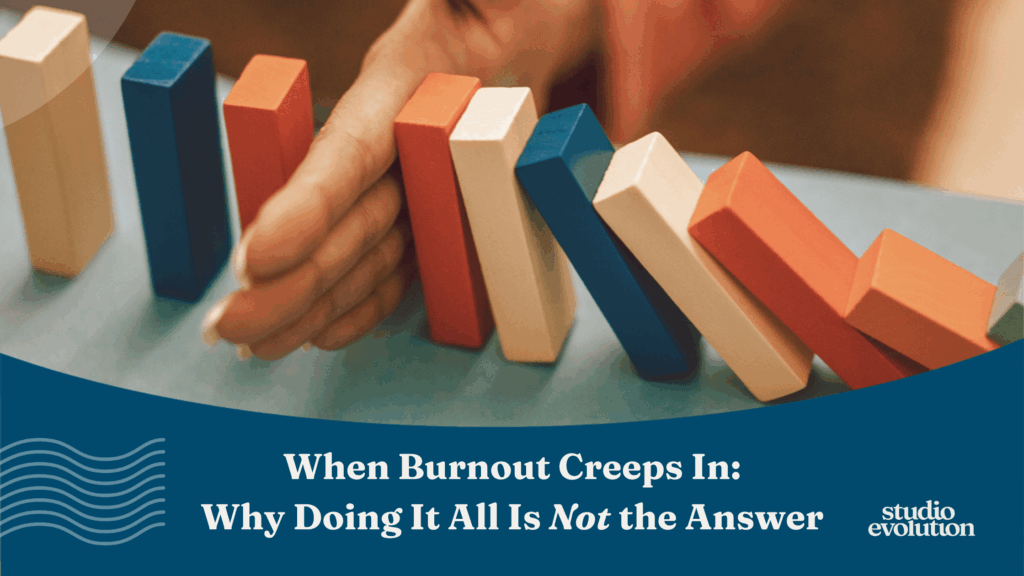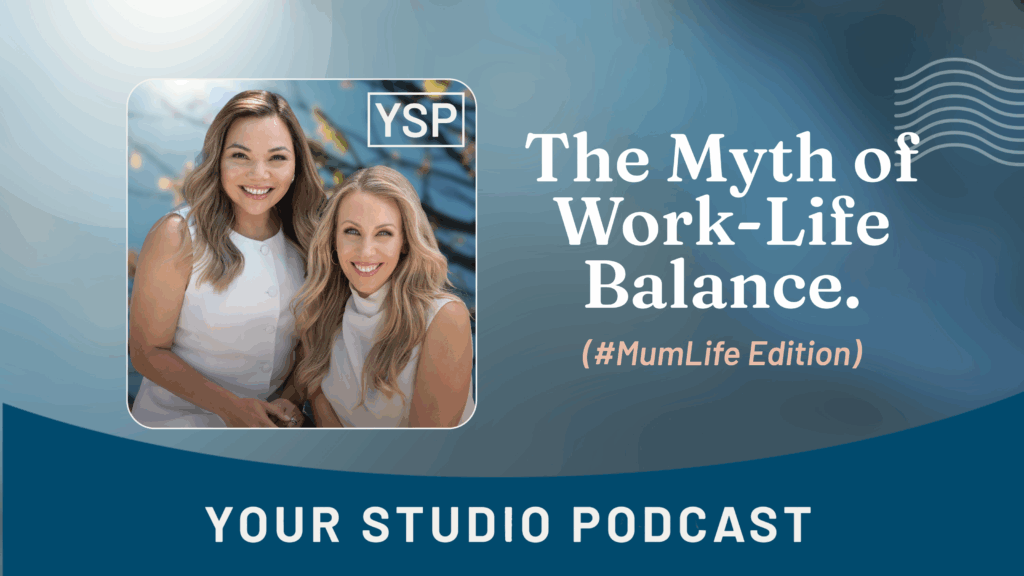Feeling burnt out from doing everything for your studio with nothing left for yourself? In this episode of Your Studio Podcast, follow Chloe Sutton as she begins her journey in Fix My Studio, our new series following studio owners making big changes inside Studio Evolution.
Discover how Chloe is rebuilding after burnout and creating a business that supports her energy, purpose, and long-term growth. Tune in for insight, encouragement, and your next gentle step forward.
Please subscribe + review!
Voicemail: https://www.speakpipe.com/LeaveEvolutionAVoicemail
Instagram: @thestudioevolution
YouTube: @thestudioevolution
Facebook: @TheStudioEvolution
Website: studioevolution.com/start
Michelle Hunter (00:34):
Hello friends. Welcome to your studio podcast. It’s Michelle Hunter here with my work wifey, Chantelle Bruinsma.
Chantelle Bruinsma (00:41):
Hi everyone. We are going to tell a little story to begin with. We’ve got a very new segment, an exciting new segment to share with you today, and it all became from a dream that Michelle and I share. Michelle, do you want to tell about what you like to do in your spare time, one of your favorite indulgences?
Michelle Hunter (00:57):
I think a lot of people out there and send us a note if you are the same. I think a lot of people love to relax by watching other people do their life, love reality tv. It is my absolute jam. It completely relaxes my nervous system and I’m just all there for it.
Chantelle Bruinsma (01:14):
So what are your favorite shows? What are your favorite shows that you watch?
Michelle Hunter (01:17):
Oh, look, there’s a Wided range. So from the Kardashians, do not judge me.
Chantelle Bruinsma (01:24):
I judge you. I’m quite open in this. The woman I knew that I couldn’t even really have a conversation with her on Monday because the Sunday even episode will be released in the US and then on Monday she’s like, don’t talk to me until I’ve watched like okay, that’s fine.
Michelle Hunter (01:38):
I love 90 Day fiance. There’s teen moms, there’s a lot. There’s a lot
Chantelle Bruinsma (01:44):
Dubai Bling. That was a recent one.
Michelle Hunter (01:46):
That was a recent one that I watched in the whole weekend when I was off. So there’s a lot, but what I love about it is you’re practically just following someone. And of course they divulge in storylines, but it’s just the interest of people watching and being nosy of what people actually do in their lives. And then this kind of escalated, didn’t it? Chantelle into a different conversation between you and I?
Chantelle Bruinsma (02:09):
So Michelle had this idea, we should do a reality TV show. And what we could do is Michelle and I would go to a real life studio and the studio would be struggling and it would be just all, there’s not systemized and marketing is kind of struggling and it might be team challenges like all the drama. And then she and I would go in and we would go in and we would clean it up just like Grand Designs the studio business and we’re going to call it Fix My Studio. We bought all the UI roles, we bought all the domains, we own them, we own all the marketing for it already. We 48 hours. We were obsessed with, okay, we’ve got all the storyboarding, we got all mapped out, right? We’ve
Michelle Hunter (02:48):
Got all the camera
Chantelle Bruinsma (02:49):
Equipment. Yep, we’ve got podcast producers on team. Oh my gosh, he could do the interview, the editing. We were set and ready to go. Went costume. I was like, you were like Michelle, you got to go shopping,
Michelle Hunter (03:01):
You got to show your gym outfits that you turn up to school every morning is not going to be enough. You’re going to go straight to filming.
Chantelle Bruinsma (03:07):
You’re going to need more than just tights, hun, you’re going to need more than tights. Just putting it out there. But then we kind of realized like, oh, we have a lot of children and we’re in a very active parenting stage and we also run a company and it would require a lot of filming. So we’ve kind of been like, there’s another way we could maybe do this.
Michelle Hunter (03:24):
Yeah, absolutely.
Chantelle Bruinsma (03:25):
Through the pod.
Michelle Hunter (03:28):
So we are bringing Fix my studio to you here on the podcast,
Chantelle Bruinsma (03:33):
But we’re also open to any kind of major network channel who might happen to be listening to the episode. If you’re listening, if you want to figure us up, we’re here,
Michelle Hunter (03:42):
We’re available. Very engaging online, not I think they would. They’d be like, first Michelle, stop laughing with your mouth open so wide all the time.
Chantelle Bruinsma (03:58):
Look, girls got a dream right? Girls got a dream, girl’s got to aim
Michelle Hunter (04:02):
Eye in life.
Chantelle Bruinsma (04:04):
So we’re doing the next best thing, which is kind of like fix my studio, the podcast edition, which is we have just got a brand new evolutionary member. She’s starting tomorrow, she’s joined the program and her first day is tomorrow. And so we have just done this interview. Incredible woman, when you listen to this episode, just prepare for your heart to be just expanded open with inspiration. She’s just a trailblazer, remarkable, remarkable human and visionary. And today’s day zero of her journey. And we are going to check in with her through the pod over the coming two years to see how she’s going through the program, the crunchy bits, the stretch bits, the challenging bits, what’s going on in the business and seeing how everything comes to light over the next two years. And we can actually see, and I’d like to follow her beyond to be honest, because she’s the most remarkable woman. We’re going to track her progress, which we are pumped about, right Michelle?
Michelle Hunter (05:00):
Yeah. And we’re going to see the transformation in real time. I think that’s what the beauty is, just like this reality TV show. We’re going to actually see her come up against obstacles in her studio business and in real time see how she’s going to move through them.
Chantelle Bruinsma (05:14):
Very, very excited. So enjoy this episode with Chloe Sutton. She runs the self-care sisterhood based in Newcastle in New South Wales, Australia. And this is a woman who has overcome enormous obstacles to follow her vision for an inclusive space for women and those who identify as or she or they to be able to embrace exercise to bring more holistic health and overcome chronic illnesses and depression. Just the most awesome human. And we are so proud to welcome, augment, do our program and I’m incredibly excited for you to listen to this episode. So dive on in and enjoy checking out Chloe’s story.
Chloe Sutton (05:52):
Thank you so much for having me. I’m so excited to be here. I have been stalking you online for quite a long time and listening to your podcast, so I feel a bit excited to be on here. Bit of fish.
Chantelle Bruinsma (06:03):
Oh, this is so fun. This is so fun. So the vision is friends, we’re going to get to know Chloe on the pod over the next couple of years. So we’re going to keep checking in with her through her studio evolution journey, what she’s doing, what’s evolving in her life and her business. And we can actually see in real time the transformation that she’s about to undertake. So we are pretty excited about what we’re going to do. So thank you for being here with us. Did you want to kick off Chloe and tell us a bit about the self-care sisterhood even at the title you had us hooked?
Chloe Sutton (06:37):
Yeah, so I basically started my business out of recovery from really severe endometriosis and migraines. And so basically the business started, I did a clinical pilot trial with Newcastle University called Healthy Body, healthy Mind for Women with Depression. And basically over the 12 weeks I learned how to strength train and I was in my final year of uni and I was like, oh my God, why has no one taught me this before? This is life-changing. And basically over the 12 weeks I went from moderately to severely depressed to basically not ranking depressed on their scale. So it was like obviously medication and therapy helps too and it did, but knowing how much a skill of exercise could help me in the rest of my life with my mental health was revolutionary. And so I finished my degree and then I got really, really sick and couldn’t keep teaching. And so I was like, once I get better, I’m going to retrain to become a personal trainer to help other women like me. And basically the business began as an Instagram page to document my recovery. So if you scroll all the way to the bottom, you’ll see the really cringe first post super cringe.
Chantelle Bruinsma (07:46):
This is the first thing thing we’re going to do after we jump off, right Michelle?
Chloe Sutton (07:49):
Yeah, it’s super cringe. I invite you to look at the cringe. I think if it’s not cringe, you started too late. So that’s how the business started and then it kind of evolved into starting an in-person studio, women with mental health, neurodivergence, chronic illness, chronic pain, and then it’s kind of grown from there. So yeah, that’s kind of how my business started. I basically started it for me because I wanted a place to go that wasn’t terrifying and full of gym bros and
(08:21):
Half naked people. It wasn’t really my jam. And for me, someone with really bad anxiety, having lots of men grunting and screaming and it’s just not the vibe. So we’re female only we’re for she’s and they’s, so anyone but cis men basically. And just to create a safe space for people to move their bodies because it’s quite a vulnerable thing to move your body and especially post-injury or chronic illness. So yeah, that’s why I started the business. I started it for me and then it kind of grew from there. And now we have a studio in New Lambton in Newcastle and we love it.
Chantelle Bruinsma (08:59):
It’s really phenomenal seeing how this business has come from such a need. I mean what you’re doing is so trailblazing, so innovative, so inclusive and heart-based, really inspiring. And that’s why when you join the Leap, I was like this woman that I am all here to see where this business can go because it’s so needed. And Michelle, you are all in the strength training world. This
Michelle Hunter (09:25):
Is all in strength training and I suffered endometriosis for years and years. So I was just thinking when we read your application, I was like, I wish I had Chloe’s gym near me back in the day. So it’s such a need. It’s such a need and it’s addressing such a huge need and because been in that position, you’re so passionate about it, you have so much empathy. You understand when you go to Word like a normal gym or studio, when there’s bro gyms, when they don’t understand that, they just totally miss the mark in that sense.
Chloe Sutton (09:51):
Yeah,
Michelle Hunter (09:52):
Yeah,
Chloe Sutton (09:53):
Definitely. I think a lot of places don’t realize that women aren’t just small men. We are completely different and we have different needs. And if you’re living with a complex chronic illness or disability, like me, I have multiple disabilities and things going on, you can’t just white knuckle your way through it. You need actually a completely different approach. And it’s not those stupid gym phrases, never miss a Monday or just keep going or just do it. It’s like actually no, that’s ableist. And it’s also reinforcing the patriarchy a little bit too. It’s like,
(10:27):
No, we have different needs to you and that’s okay. We’re not wrong, naughty or bad. It’s a need. And so we need to fill that need and care for people where they’re at without judgment and with kindness and compassion really. And you can’t learn by shaming yourself into doing something. You have to have a foundation of safety. And we know that safety is the foundation of all learning. So that’s kind of how I approach it and I kind of bring my primary teacher kind of early childhood brain into that lens as well and go, okay, well how can we help people best learn? They can’t do it when they’re petrified and
Chantelle Bruinsma (11:02):
Their bodies can’t transform when they’re terrified either. If they’re not feeling safe in their nervous system, how is real change going to occur? Absolutely. Yeah,
Chloe Sutton (11:10):
Yeah,
Chantelle Bruinsma (11:11):
Definitely. So have you created your own kind of process, your own methodology, your own curriculum? How have you approached this and how you train your team?
Chloe Sutton (11:19):
So we’ve kind of developed it over the years. Basically we kind of build from the framework of self-care isn’t selfish, but also helping people to understand. A lot of people hear our name of our business and go, oh, and their head tweaks and they’re like, oh, but you don’t just mean facials and bubble baths. And I say, no, our foundation is actually, we call it the self-care system. We’re on the lens of anti-racism. So we know that diet culture oppresses people and we know that it oppresses minority bodies and disabled bodies. And so we kind of go off the A Lord quote of self-care is an act of resistance and an act of political warfare. And so we are going to stand up against patriarchy, racism, ableism, sexism, all the isms to make sure people have safe place to go. And we obviously don’t, don’t say we’re a safe place because up to the individual to decide what’s safe for them, but we want to build the framework so that learning can happen and they can build body trust and body autonomy. So that’s how we built the framework with our team. Our team is mostly neurodivergent and chronically ill women. So we all have a lived experience,
(12:32):
Which happened by accident, but we all have a lived experience with either neurodivergence, mental health, chronic pain, chronic illness. And so we use that lived experience to care for people where they’re at and not judge them and kind of give choice and give options where needed so that person can feel heard and seen and understood. And a big part of our learning with our team is building a sense of belonging for our members. A lot of people say to us, they’re really lacking a third space in their life. They’ve got home, they’ve got work, they need a third space. And so we kind of try and be that third space and do that with our team and also with our members
Chantelle Bruinsma (13:14):
As a studio owner, how have you balanced, I mean I’m sure there’s mini a lot of studio owners listening right now saying that running a studio is hard, adrenaline when you have full health, how have you managed this? It’s astounding.
Chloe Sutton (13:32):
I’m not going to lie. It’s been an absolute rollercoaster and when I say rollercoaster, I don’t want to swear, but it’s been an
Michelle Hunter (13:41):
You can.
Chloe Sutton (13:42):
It’s been a shit storm and only have been able to maintain it through the external supports around me. So I’m not bad at asking for help. I am also an NDIS participant as well. So I have supports in those areas,
Chantelle Bruinsma (13:56):
Which means for the overseas people, a national disability, I dunno what the is
Chloe Sutton (14:03):
Framework or they kind of give you supports and funding for areas to help you basically get as close to baseline as you can. So I get supports there. I also have an amazing husband who is the reason I started the business. He actually posted the Facebook page
(14:21):
Without telling me. I told him my idea 10 years ago and he’s like just made a little Facebook page. And I also have a bunch of amazing friends and family that I lean heavily on, but I’m not going to lie, there have been many, many, many days where I’m like, that’s it, I’m quitting, I can’t do this. And then a member will send a review or someone will send a message to the business and they’re like, this has been life-changing. I dunno what I’d do without this place. And their stories propel me to not give up because I know that there’s not many places like us and they need us. And so I always go back to the reviews and I go back to the things my members say to me about how it’s helped them. And I’m like, okay, I’m doing it for them. We move for our mind. I’ve got a lot of supports in my industry in the fitness and health at every size space, dieticians and mentors that kind of say to me, don’t give up. We need you. Well
Chantelle Bruinsma (15:19):
That’s exactly what we do. That’s exactly it. Listening to you, we need humans like you doing this work for the future of humanity and to create the societies that we want to see around us and to ensure that no one is left behind on the sidelines. And people like you need to be lifted, they need to be supported, thank you. And doors open and it’s, we just need to clear the path so you can just be you because you are this visionary and studio owners so many of you, you’ve got a mission, you’ve got a real true calling of why you’re doing what you’re doing. But it’s tough. It’s tough. And so I’m just so excited for our whole team to just lift you up over these next two years. It’s going to be a very, very special experience. Thank you. Very special experience. Isn’t she remarkable, Michelle?
Michelle Hunter (16:08):
Oh my goodness. Just what you’re giving back to the community and yeah, it’s just this one gets me in the gut, but as someone who was isolated for so long, not having that third space is so important. So, so important. And being a studio owner can also be very isolating, Chloe. So it comes to my next kind of question. We know that you’re a leaper, so Chloe has joined our program, the Leap. And you said that you stalked us for a little bit, but what was your journey of coming into the studio evolution world? I get really interested when we work with so many studio owners, how did you find a stumble across Chantelle or the company?
Chloe Sutton (16:45):
Yeah, I think I found you guys first through your podcast and then I was just trying to find someone who understood service-based businesses, but service-based businesses with heart. It wasn’t all about getting as many members in as quickly as possible. It was like I actually wanted someone who understood mission-based business with a vision. And I just loved, this is probably going to sound really funny, Chantelle, but when I heard your voice, it was so calm and grounded and I was like, this lady knows her stuff, but also this probably sounds a bit rude. She’s not one of those marketing bro wankers. You know what I mean? They’re kind of like the
Chantelle Bruinsma (17:22):
Nicest thing someone said to me, so nice to say, I’m so grateful you see me.
Michelle Hunter (17:27):
She’s not a wanker,
Chloe Sutton (17:30):
She’s not a wanker. Sorry, that sounded so rude.
Chantelle Bruinsma (17:33):
I love that. I want to be that human. It’s exactly who I want to be because it, it’s bullshit, right? The hustle culture, it’s just exhausting. Oh my gosh. It’s just like for me it’s the businesses. I believe studio business thrives when the studio owner thrives. You get the leadership you get, get the system supporting the studio owner, allow them to be calm and relaxed and visionary and creative and playful. The business is going to thrive and that means allows you to do this work. So I struggle with, struggle with seeing studio owners in programs like that. And honestly, I think if you’re getting help, whoever you are attracted to that is fantastic. If you’re getting support and you’re learning, that’s what I care about. It’s also just the holistic and in your work at the self-care sisterhood, it’s not just about how many reps, it’s the context and the meaning of the reps that you’re doing that matter. Why are we doing it? Yeah,
Chloe Sutton (18:32):
Definitely. I just love listening to you guys to talk on the podcast and hear that the genuine friendship and support that you have for each other, but also just you’ve done, I know that you’ve done the hustle. Some of the things you say in the podcast, I’m like, okay, she’s definitely owned a studio. Whereas there’s so many other programs out there where people just, they start a million studios, but they’ve never actually been in the hustle. They’ve been outside of it looking in and it’s like you can really tell by the way they market. And so I just was like, my little spidey senses were like, this looks good.
Chantelle Bruinsma (19:04):
You found your peeps, you found your peeps, found your peep.
Chloe Sutton (19:06):
Yeah,
Chantelle Bruinsma (19:06):
It’s so lovely. That’s so lovely. Well welcome, welcome, welcome, welcome, welcome. And I’m so looking forward to meeting you in person at one of our retreats coming up. It’s going to be very special. So let’s start this whole kind of time capsule process. So my vision is I want to know a kind of crunchy bits, like what’s happening in the studio. This is going to be a really beautiful anchor point in your life. This episode for me is to hold how you feel in relation to your business. And I know what you give your beautiful clients who come to the self-care studio, you see how they feel. And what I’m most excited about is going to see how you feel at the end of the two years. So would you give us a bit of a lens on how you feel in relation to the running, the profitability, the holding the team? I think you’re great at team. I don’t think team going to be a big problem for you or you’re natural leader, but how you feel at marketing and how it’s going right now. Let’s get a snapshot.
Chloe Sutton (20:02):
So I love my team. My team are amazing. We have a really amazing core team. This year especially, I just feel like I can breathe. I feel like everyone in my team has integrity and they get the vision of the business. They’ve really dialed into what we’re doing and we’ve kind of put them in areas where it’s kind of like their green lights. So that’s where they thrive. Okay, you do this, that’s your thrive point. I think the thing that I want to work on the best with the business is my disability gets in the way of me being consistent in certain areas of the business. So marketing and just being consistent in those areas because some of those things are things only that I can do because I need to grow the vision. And I’ve taken a step back from classes. So I’m in a position now where I’m working a lot less with clients, but I’m still doing a few anchor points during the week, which is what I want to keep doing.
(20:55):
But yeah, we want to grow the business. We’ve grown a lot through the leap, which has been amazing and it’s just been so exciting and it just makes sense. And I’m like, oh, okay, perfect. I want to learn, excuse me, how to market the business better, how to grow the business. We’re quite a niche the way we present in our community. So we’re not for everyone. We know we’re not for everyone. So we know that that’s going to make it a little bit harder to grow because we’re having to market quite specifically. But when we find our people, they don’t leave. They’re like lifers, they stay forever. So we have a very low churn rate, very low. And we want to figure out how we can make, I guess the business more accessible to more people with disabilities. So we really want to grow the business to online coaching. And then we’re in the process of building an app at the moment so we can care for more people in a price point that they can afford so we can care for more people like me and build profit in the business. I would say the girls, the more profit we have, the more people helped. It’s not like an icky, yucky, how people have that money mindset thing. I’m like, no, no. If we have more profit, we’ve literally helped more people. So it’s, it’s this thing. I’m kind of working on the team around money mindset,
Chantelle Bruinsma (22:14):
Wow, bravo.
Chloe Sutton (22:16):
And they’re really starting to get it. Yeah, thank you. So it’s taken a lot of work and I’ve had to do that work with money mindset stuff too. But I think yeah, just learning more about money, more about marketing, more about, we’re doing a lot of work in systems in the business. I’ve just taken on my beautiful staff member, Toni, she’s stepped up to operations manager, so wonderful, which we talked about for a little bit. And she’s like, here’s all the things I love doing. And I was like, they are every single thing that I hate doing. Perfect. Please take them immediately off me.
Chantelle Bruinsma (22:53):
Isn’t it just the greatest thing ever? You found your unicorn, you found your Michelle. It’s like
Chloe Sutton (22:57):
Truly, I literally almost cried. I was like, I need to have a big drink and a lie down. So relieved. So she’s able to take on some things where just as part of the business, you need to be more consistent. And due to the nature of my disabilities, I just physically cannot be that consistent with some of those things. So I’m better suited to be visionary, overarching vision of the business, marketing, the big picture stuff, the creative stuff, which I can do at times that don’t affect clients. So I can be at 11:00 PM at night making graphics, it won’t affect anyone else. And just wanting to learn how to do that, I guess, and be a better teacher and a better leader. And I think I’m bottlenecking the business a little bit, so figuring out how to step away where I need to so that it can grow.
Chantelle Bruinsma (23:50):
Tell us a little bit more about that, how that’s playing out the bottlenecking.
Chloe Sutton (23:55):
So I was just teaching too many classes. And so with the nature of our business, some of our staff members have fluctuating health conditions as well. So I was just so burnt out myself. I was just stepping in to teach for them rather than actively looking for a new replacement. And so I had a lot of fear around finding new staff members because we’ve had experiences in the past where we’ve brought on a staff member, it’s worked out for a while, but then it turns out they weren’t fully on board with our mission.
(24:25):
And when we tried to bring that to them, I probably didn’t do it the best possible way I could have. And so later on I learned, okay, I could have done that better, but then also they didn’t want to be part of the vision. So being more accessible to clients and kind of things around just making sure that they have options in class. We need to be disability accessible and making sure that the teachers are on board with that. And so it was kind of tricky. And then also we had a lot of contractors, so it meant that we had fluctuating people coming in and out of the business. So it didn’t give continuity to the members.
(25:04):
And that’s just the nature of contractors. So we are moving now completely to an employee only model so that we can ensure that we have more kind of control over that, but also more opportunity to help them grow as staff members. And that’s something I’ve realized I need to do better as well as how can I facilitate their growth whilst also caring for myself with these disabilities, but had some exciting things happen. I’m on a new heart medication, so my capacity has grown by 50% in the last four months. So it’s really exciting because literally six months ago I was like, I might actually have to shut this down. I don’t know which way it’s going to go, because I wasn’t able to walk for more than 10 minutes at a time and I’m running a fitness studio and I can’t walk. So it’s like, what do you do? It’s very hard. So the new medication has helped. And then I joined the leap around that time when I started the new medication, and then it’s kind of just all come together and I’m really excited. So it’s just accepting the reality of my disability will fluctuate. And so I need to disability proof my business basically, or have people say they baby proof their business and I’m the baby, I need to baby proof myself.
Chantelle Bruinsma (26:25):
Well, you’re the most precious one myself. You are the most, and all of you, all the studio owners are the most precious ones and they’re often the least cared for. But I so respect in what you’re sharing, Chloe, is how deeply you actually accept yourself and accept your needs. And it’s quite rare actually, I think for someone to be so self-aware in the sense of understanding if I do this, then everything else benefits. I’m sure it hasn’t always been easy. You’ve probably ran into walls and had that happen. It’s a process of learning. But to be in a place now where you recognize that actually it’s like the studio name, the self-care of the studio owner is in many ways the highest priority. That if we sustain that and protect you, you are able to be, again, more visionary, more creative, and again, reach more people. That’s the goal.
Chloe Sutton (27:17):
Definitely. Yeah. And wasn’t always that self-aware. Probably two years ago there was a point in the business where we had staff members coming in and out and I wasn’t aware how much my disability was affecting the team. And so I’ve done a lot of learning and growing, and so it was hard. It was really hard, and I was like, okay, I need to get real with this. So it was definitely hard one it, it was hard one, it was kind of like a slap to the face. But now I’m there. I’m like, okay, this is where we can go. Yeah.
Chantelle Bruinsma (27:47):
May I ask you a question?
Chloe Sutton (27:49):
Yes. Go for it.
Chantelle Bruinsma (27:50):
With you stepping into studio evolution, what do we need to know to help best support you? What would help us facilitate your greatest learning? And I’d love to know what for you would give you the greatest sense of support.
Chloe Sutton (28:12):
I think just the way that you guys have already been doing it would just the regular check-ins and the emails. I think understanding that I won’t always be able to go to everything, but I’ll always try my best to come where I can. And I found the replay is really helpful in the leap. I’m trying to think. I think just, yeah, if you notice that I’m a bit out of it or you haven’t heard from me, just to check in would be really helpful. So yeah, I live with lots of things. I’ve got a POTS syndrome, I’ve got endometriosis, chronic migraine, I’ve got autism and ADHD, so I’m a little bit to neuro diversion and depression and anxiety. So I’ve got all these things. Oh, and fibromyalgia. That’s another one I got as well.
Michelle Hunter (29:00):
That’s tough.
Chloe Sutton (29:01):
So I’ve got the whole bag of things.
Chantelle Bruinsma (29:03):
How are you so joyful? Look at the joy. I know. Just so much joy. Look at this joyful, joyful radiant.
Chloe Sutton (29:09):
Truly, joy is my resistance. Joy is my resistance. So I lean heavily into the glimmers and the little things, the gs. Yeah, it’s been a long journey to get here. I was not always like this.
Chantelle Bruinsma (29:24):
No, you’ve worked for it. I believe that. For sure
Chloe Sutton (29:28):
I was not, yeah, I was not this person A couple of years ago. I think COVID forced me to actually realize. So I didn’t know I had autism and ADHD until about 2020. And then COVID kind of broke me, and then all of the accommodations that were around me just in normal life weren’t there. And then it was like, oh, hello. She actually, it’s really hard with COVID, but being away from people actually helped me having longer periods of time where I didn’t have to talk. I didn’t have to give eye contact. So moving into this role in the business where I’m less people facing has actually helped me to be, when I am people facing, I’m like,
Chantelle Bruinsma (30:12):
You’re there.
Chloe Sutton (30:13):
I’m lit up.
Chantelle Bruinsma (30:13):
You’ve got more energy.
Chloe Sutton (30:15):
I’m present.
Chantelle Bruinsma (30:16):
I’m
Chloe Sutton (30:16):
Fully present. That, and people have noticed. So my members are not shy. They’re like, Hey, you seem really good today. They’re also divergent as well.
Chantelle Bruinsma (30:27):
Tell it like it is.
Chloe Sutton (30:29):
Yeah. But no. Yeah, any support. If you just think maybe you haven’t heard from me for a little bit, a check-in is never offended or weirded out. I’m actually like, yay. They love me. Thank you. That’s
Michelle Hunter (30:42):
Good to know. That’s beautiful.
Chloe Sutton (30:44):
My executive function isn’t the best, so I will sometimes forget to do things and then I’ll get the little reminder. I’m like, oh, well, better do that. Beautiful,
Chantelle Bruinsma (30:52):
Beautiful. So if we were to zoom out wildest dreams, fairy godmother, you can have whatever you want. You can have whatever you want. The biggest iteration of reaching, connecting, transforming people, not just in maybe the Newcastle but this online. Can you paint the picture for us of what your dream would be, both in what you’d realize in the business, and then also what would that give you in your life? I know when you said your application, you want six weeks off a year, but I want you can ask for it all.
Chloe Sutton (31:24):
Yeah. I think for me, I want to be able to help as many women as possible like me. So I guess my big scary audacious goal would be to have a thousand online members or more and be able to reach people who are stuck for me. For a long time, I was stuck at home for two years, extremely isolated. And knowing what that feels like, it’s soul sucking. And it almost cost me my life, if I’m really honest with you guys.
Chantelle Bruinsma (31:54):
I bet.
Chloe Sutton (31:55):
So I’m a suicide survivor, and that is a big part of my business mission, is helping other people to know that they’re not alone. And there’s so many tools that you can do to help you stay alive and not just stay alive, but thrive.
Chantelle Bruinsma (32:11):
Thrive.
Chloe Sutton (32:12):
And we are not always taught them as women. So if I can facilitate that, I really want to grow to build a teacher training program within my business to help other people. I always get requests, can you start a gym in Queensland? What about Tasmania? And I’m like, my brain just goes, oh, that sounds really hard and I’m really tired and I’m disabled and I don’t think I have capacity. But if we could do a teacher training program to instill the vision and the way we train our teachers up to help them help more people, I think that would be better.
Chantelle Bruinsma (32:47):
I guess a certification program, my own podcast,
Chloe Sutton (32:50):
Pretty much.
Chantelle Bruinsma (32:50):
I could imagine having a full certification program where we’ve really refined the particular kind of methodology of here is the kind of process and there’s some systems in it and some very cool clarity. And that way, again, in Newcastle going to grow your own studio, own teachers through the studio, but then be able to educate people. I do know some models of that that exist very, very successfully, where then they could start their own branch of the self-care sisterhood in their regions. And there’s an umbrella organization that oversees these kind of satellite locations, if you will, with one affiliated central brand. So I mean, that makes total sense in what you are saying.
Chloe Sutton (33:32):
And I didn’t come up with that idea myself. I actually had some mentors of mine within the health and every size space, beautiful friends of mine, Susan and Meg, who were dieticians and they’re like, you need to start a teacher certification process, but this was in 2019, and I was like a baby business back then. I was like, oh yeah, that sounds nice. I’ll write that down. Not really think much about it. But now I’m like, actually,
(33:55):
I could help. I think my approach is one to many. I think I want to try and figure out how I can do that with my capacity. And also just knowing there’s all these other disabled business owners that I’ve met online through Instagram and seeing how they do it, and I’m like, oh, thank God. There’s a role model to aspire to in their specific industries, which are different to mine. And then I just really want to grow our business in Newcastle and just help as many women as we can there. We are really wanting to grow to 200, 2 50 members, which we’re on track to do. We’re growing each month, which is really exciting. And I’m just wanting to facilitate that growth without losing the vision and the heart of the business. I know a lot of businesses can grow really quickly and then they lose steam and then they lose momentum. And I’ve seen that happen with throughout the last couple of years. I’ve seen other businesses do that. And then I don’t know, they lose their secret sauce. I don’t know what to call it. It just kind of becomes about the money, which is an important part of business. But I think profit needs to be really heavily tied into legacy
(35:04):
And kind
Chantelle Bruinsma (35:06):
Community. I don’t
Chloe Sutton (35:06):
Know. I think people can see through that. We have that said to us a lot, like, oh, thank God you guys aren’t just about the money. And it’s still an important part. We need memberships to sustain our business, but I don’t want ’em to feel like they’re just a number. We want ’em to be seen, heard, and understood. And that’s a big part of what we do.
Chantelle Bruinsma (35:27):
Maintaining the culture is going to be essential as you grow. And I don’t doubt that that will be on your heart every day and that that’s not something you’re going to let go very, very easily.
Chloe Sutton (35:37):
No.
Chantelle Bruinsma (35:37):
And what about for yourself? So within the next couple of years, what would you love for yourself to receive or experience?
Chloe Sutton (35:45):
Yeah, so the big overarching thing that I think I mentioned in my application a little bit is I’m very heavily tied to social justice work. And I work with a bunch of women in Newcastle called Newcastle Mums for Palestine. I also started up a group called Newi Watermelon Collective, where we fundraise for families in Gaza. Some of my best friends are there. And the overarching mission is to grow the business to sustain itself so that when and if this G side finishes, I will go over with some friends of mine in the industry to hopefully help where we can from a fitness perspective. So one of my best friends, Fadi Aldeeb is a Palestinian Paralympian. And so he really wants to work on social inclusion for people with disabilities. And so we know that there’s a huge proportion of people over there who have newly amputees and newly disabled or paralyzed. And so we’re going to hopefully work together to, it’s a long-term thing that we’re going to have to work towards, but basically I want to build a business to be able to do that and go away for long periods of time, which will be needed. I also work within some good mentors within the rehab Pilates space, so wanting to be trained up more by them so that I can then go and be of help.
(37:06):
And potentially, I’d love to have a baby one day. That would be amazing. If my uterus cooperates, we’ll see what happens. And I think for me, just to feel like the wheels aren’t going to fall off the
(37:20):
Business. It’s been a really stressful couple of years, and I think I’ve still, my team would say this about me that I’m still traumatized by COVID and how that affected our business. We had a pretty tumultuous time. We had to, basically, we went into lockdown and then we were told we had five weeks to leave the place where we were because our lease was ending and they weren’t renewing it. So we had nowhere to go. And then we found a new place, and that was great for two years, and then we had to leave due to dodgy landlord issues. And so then that cost us a lot of money to get out of that. And then we went to New Lambton and we love it here. But if it wasn’t for the help of my amazing team and the community keeping us going, and my beautiful dad helping me to get the bond for the new place, yeah, it was a scary, very stressful financial time. It was just thing after thing after thing, and then not knowing I had POTS and not knowing I had ADHD and autism. So it was all a cluster of finding those things out along the way. It’s
Chantelle Bruinsma (38:28):
Been a big couple of years. It’s been a big couple of years.
Chloe Sutton (38:32):
It’s been a big couple of years. I’m keen to just, my theme of this year is actually slowly just keep plotting along. Do 70% pace yourself. So yeah, my team does say I have a trauma response when someone mentions COVID, my eye twitches, and I’m like,
Michelle Hunter (38:50):
Understandably.
Chloe Sutton (38:52):
But knowing that we’re five years out,
Chantelle Bruinsma (38:54):
but it’s interesting. I would say in the industry, there is a overwhelming PTSD in studio owners from COVID, even to the degree where, so we ran Elevate a live event last month, eight weeks ago, seven weeks ago, something like that. And we were doing a bunch of money work, and I was just reading the room and intuitively just like, we actually can’t move on. I can’t move on with teaching until we actually look this in the face and start to heal it.
(39:24):
And I kind of went to Sam, who’s going to be your mentor in the break? I said, we have to just kind of pause for a second and we need to address this. And I said, we got all the members an invitation. I decided to do a campfire burning. So we all walked down to a campfire and they wrote a letter of the grief and of the rage and of the hurt, and of the what was taken away from them because there was so much still being held. People hadn’t raised their prices from pre COVID days because they were still so scared about the impact on families and if they left. And so they were stuck in 2019. All of the angst was there. And so all the members came down to the campfire and they read it all aloud, and we held it together.
(40:11):
Well, not all of them. Some chose to not because they didn’t need that process, but having a place where we actually could address it, the emotional side of what you was held is essential because unless we can move that through, we stay so frozen. So frozen, there was a lot of tears. There was a lot of tears in that moment. But I believe it to be true, Chloe, I believe it to be true that there is a collective still trauma from, particularly for our industries. We were such an incredibly hard hit for our industry. We had the personal relationship. We had space, and we were expected to transition our businesses online immediately. It was bonkers. Bonkers.
Chloe Sutton (40:57):
It was insane. And I feel like only my small business friends got it. Everyone else in my life was like, oh, just keep running a business. And I’m like, I’m about to pass out. For me physically. There was a few moments in that first month. I actually thought I was going to pass out, standing up because I was so exhausted, because I was doing so many. And then going online, we had to deliver the classes and we had to figure out audio sound,
Chantelle Bruinsma (41:22):
All the tech
Chloe Sutton (41:22):
Technicalities. And then you then had to deliver more with your body as a teacher because they were watching you online. Absolute. I got injured. I injured myself twice because I was just over training. And I remember thinking, coming out of it, I never want to exercise again. I was so over it, and I was just like,
Chantelle Bruinsma (41:44):
And presenting on Zoom. It needs so much more energy. When you’re teaching on Zoom, you need so much more than when you’ve got, because you can rely on the energy of the classroom. You’re there with the peeps. Everyone brings the energy, but when you are there looking at that little green dot, you got to bring it. It’s very, very difficult. And then there was also the fear, the perpetual fear of if someone comes in with COVID and then if it spreads, that whole kind of action response plan of if this goes down, it was this constant low level anxiety of responsibility and risk.
Chloe Sutton (42:16):
And we’re still seeing the effects of COVID in our business today. I often say to the team, it’s probably like a four to six week period, every four to six weeks, we have another outbreak of influenza, COVID, RSV. Something happens. And so people are like, oh, but it’s not still affecting you. I’m like, yeah, it’s getting pauses. And then people will come in, give it to probably, it was about a month ago, we had someone bring it in by accident. It wasn’t symptomatic. They gave it to the entire class, and we had up to 20 pauses.
Chantelle Bruinsma (42:43):
Oh my gosh. And I
Chloe Sutton (42:44):
Was like, it was really stressful. So I was like, oh my God, we’re back in lockdown again. This is horrific. And so we had to put in really strict rules, autoimmune compromised. So with some of my team, I have a staff member whose dad has a lung condition, so we were like, he gets it. It could be terminal. So I think people just forgetting that disabled people exist and we’re the most at risk.
Chantelle Bruinsma (43:08):
Still need protection.
Chloe Sutton (43:10):
Yeah, it’s really scary. It’s really stressful. Yeah.
Chantelle Bruinsma (43:13):
It is genuinely. It is genuinely, no, it’s very real. It’s very real. The trauma from COVID. And I think I’ve heard a statistic that it takes five years post a very significant event just to kind of even on a collective level, for there to be a settling. And we are just coming towards that cuspy time right now. But it hasn’t even been five calm years, right? There’s been such global uncertainty. I don’t think we’ve actually had just the ease of five years of just being able to come back to ground.
Chloe Sutton (43:42):
Yeah, no, it’s getting crazier and crazier out there.
Chantelle Bruinsma (43:45):
Yeah. Crazy,
(43:47):
Crazy, crazy. That’s where it’s, it’s. Well, Chloe, I’m so honored to see this road ahead that we’re going to walk and to have you in our program. I’m really proud of you and what you stand for and what you’re creating. And we just to build the foundations of this business alongside you to get the foundations of unbelievable security and stability and support for you is going to be really just one to watch. And I’m so very grateful that you’re going to share this journey with everyone on the pod. It’s going to be a really fun ride.
Chloe Sutton (44:22):
Thank you so much. I’m so excited. Yeah. I’ll make some weird noises.
Chantelle Bruinsma (44:29):
We your people. We people. We’re going to love it here. It’s going to be beautiful. It’s going to be, well, I’ll see you at 8:00 AM tomorrow, Chloe, and we get this show on the road.
Chloe Sutton (44:39):
Yay. Excited. Thank you so much, guys, for this opportunity. I really appreciate it. I’m really excited to have an official timestamp where I can go back and listen to my own voice. I’m like, right, you said this. You got to do it now.
Chantelle Bruinsma (44:48):
The vision has been cast. We’re here for it.
Chloe Sutton (44:51):
Yep.
Chantelle Bruinsma (44:51):
Thanks. Lovely.
Michelle Hunter (44:52):
Awesome. Thank you. Oh my goodness. Oh my goodness. She’s a gun. Wow, trailblazer. Just so much heart, so much mission, so smart, and so much leadership. So stuff aware, so beautiful. It’s just amazing.
Chantelle Bruinsma (45:10):
You don’t meet humans like that every day at Woolies at the checkout, right?
Michelle Hunter (45:13):
You just don’t, no, don’t need them. You don’t need them. Definitely. I don’t. At least I don’t. Yeah, either. Do I either Do I? And just so much she has learned through her journey of herself and then how that is now brought into her mission, how it’s bringing Ripples and impact into her community of her studio. She’s going to love it in evolution.
Chantelle Bruinsma (45:32):
It’s going to be a real joy and a real honor to support her going forward. So yeah, I am pumped. Hope you enjoyed this episode. Lovely ones. Really cool little process. We’re going to start with our little kind of quasi reality TV show. Fix my studio on the podcast little approach. We are very excited to kind of swing back around and you can track Chloe’s progress through evolution and through her studio. And just like Chloe, the best place to start on your journey is the leap. And if you’d like to head on over to studio evolution.com/leap, you can find out about this program. It’s six weeks, as she kind of said on the call. She’s already enrolled so many more students just by taking this kind of six week online course and gain the support that really is transformational for studio owners. So we’d love to welcome you into the leap and get this show on the road. Thanks for being here, my friend. So grateful to you and we’ll see you next time on your Studio podcast. Bye bye.
